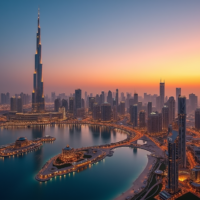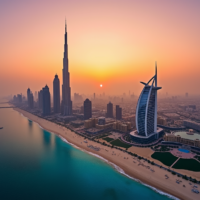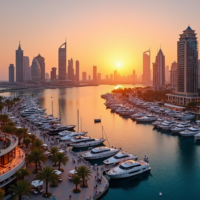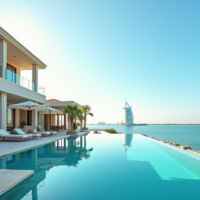Dubai continues to emerge as a premier destination for real estate investment in 2024, driven by its strategic location, innovation, and robust economic growth. The city is not only a thriving tourism hub but also a business-friendly environment with numerous opportunities for investors. With a booming luxury real estate market, diversified economy, and government initiatives that support foreign investment, Dubai is undoubtedly a wise choice for those looking to invest in real estate. As we explore the reasons for this investment allure, it’s crucial to delve into the unique features that set Dubai apart from other global cities.
The Economic Landscape: A Booming Economy

Dubai’s economic landscape is one of the main reasons it stands out for real estate investment. The emirate is part of the United Arab Emirates (UAE), a region known for its stable and diversified economy. Here are key aspects of Dubai’s economic environment:
- Strong GDP Growth: Dubai’s economy has consistently shown positive growth, making it one of the fastest-growing cities worldwide.
- Varied Sectors: The city has a diverse economy, with significant contributions from tourism, retail, aviation, and technology.
- Government Initiatives: Programs like the Dubai Economic Agenda 2030 aim to enhance economic growth and sustainability, attracting investors and new businesses.
- Tax Benefits: A tax-free environment on property investments is exceedingly attractive for foreign investors.
- World Expos and Events: Events such as Expo 2020 have bolstered real estate demand and created substantial investment opportunities.
Regulatory Framework: Investor-Friendly Policies

Dubai offers a highly favorable regulatory framework that fosters an investor-friendly climate. This structure is designed to streamline processes and safeguard investors. Here’s why regulatory policies in Dubai make property investment an attractive proposition:
- Foreign Ownership: Investors can own 100% of property in designated freehold areas, offering control and security over their investments.
- Transparent Legal System: A well-defined legal framework governs property transactions, ensuring that investors’ rights are protected.
- Easy Visa Regulations: Developers often offer visa incentives for investors and property buyers, encouraging long-term residency.
- Accessible Financing: Local banks and financial institutions provide attractive mortgage options for expatriates, making it easier to finance property purchases.
- Strict Development Standards: High construction standards maintain property values and appeal, ensuring the long-term viability of investments.
One of the most attractive features of Dubai’s real estate market is its diversity. Investors can choose from a wide array of properties, catering to various budgets and investment goals. The following are popular segments within Dubai’s property market:
- Luxury Villas: High-end villas in affluent areas like Palm Jumeirah and Emirates Hills offer significant appreciation potential.
- Apartments: The vibrant apartment sector, particularly in Downtown Dubai and Dubai Marina, attracts both end-users and renters.
- Commercial Properties: An increasing demand for office and retail spaces is evident, driven by Dubai’s position as a leading business hub.
- Off-Plan Developments: Buying off-plan properties offers lower prices and high potential returns, especially as the city’s infrastructure expands.
- Holiday Homes: With tourism on the rise, properties aimed at short-term rentals can provide lucrative returns for investors.
Strong Rental Yields: Profitability of Investment
Investors in Dubai can benefit from some of the highest rental yields globally, making it a compelling market for generating passive income. Several factors contribute to this profitability:
- High Demand: A growing expat population and more tourists result in increased demand for rental properties.
- Competitive Pricing: Compared to other major global cities, property prices in Dubai offer favorable entry points for investors.
- Government Policies: Initiatives aimed at promoting tourism and reducing barriers for investors foster a healthy rental market.
- Property Management Services: Professional property management options make it easy to maintain rental properties, optimizing returns.
- Long-Term Growth Potential: With ongoing developments and urbanization, property values and rental incomes are expected to rise.
Conclusion
In conclusion, Dubai stands out as a premier investment destination in 2024 due to its thriving economy, favorable regulatory conditions, diverse real estate options, and exceptional rental yields. Investors can capitalize on a range of opportunities, whether they are looking for luxury properties or affordable apartments. The city’s continuous growth trajectory and commitment to economic development make it a smart choice for those seeking long-term financial benefits. As you consider investing in real estate, Dubai provides a landscape ripe with opportunities that can meet the demands of today’s savvy investors.
Frequently Asked Questions
1. What is the average rental yield in Dubai?
The average rental yield in Dubai ranges between 5% to 8%, depending on the property type and location. Luxury properties tend to have lower yields, while more affordable areas may offer higher returns.
2. Can foreigners buy property in Dubai?
Yes, foreigners can purchase property in designated freehold areas in Dubai, allowing full ownership rights without the need for a local partner.
3. Are there any property taxes in Dubai?
Currently, Dubai does not impose property taxes, making it attractive for real estate investors. However, there is a one-time property registration fee, typically around 4%.
4. How does the Dubai real estate market compare to other cities?
Dubai’s real estate market often offers higher rental yields and capital appreciation compared to many other global cities, making it an appealing investment option.
5. What should I consider before investing in Dubai real estate?
Before investing, consider factors such as location, property type, market trends, potential rental yields, and the long-term growth strategy of the area. It’s also wise to conduct thorough research and consult with real estate professionals.









